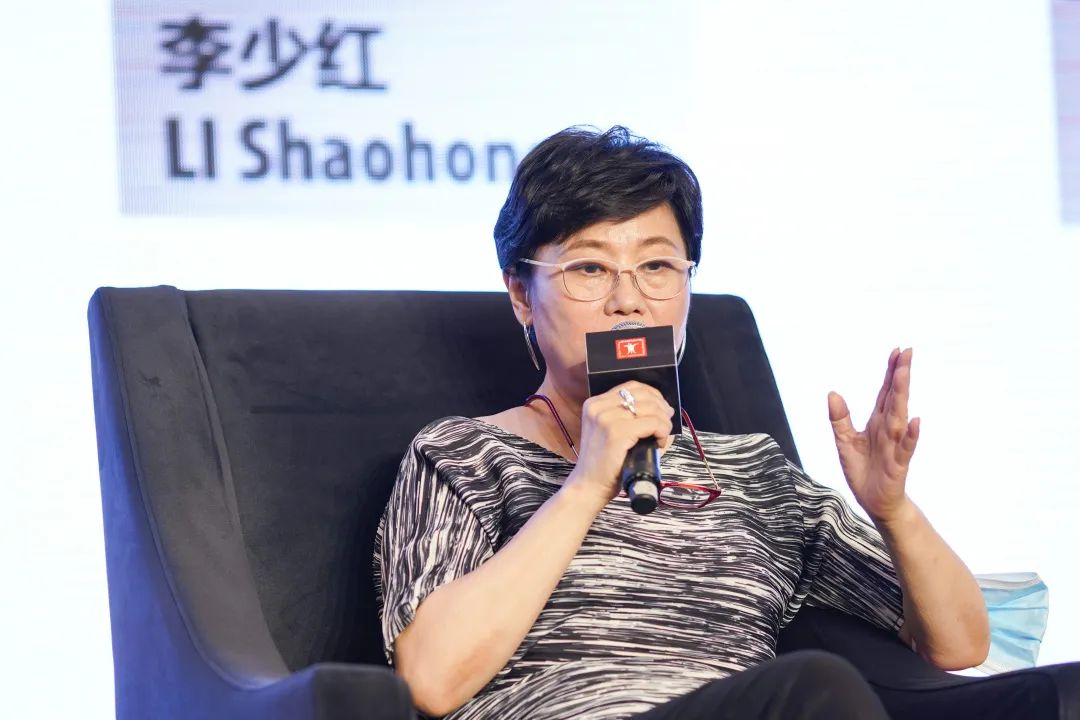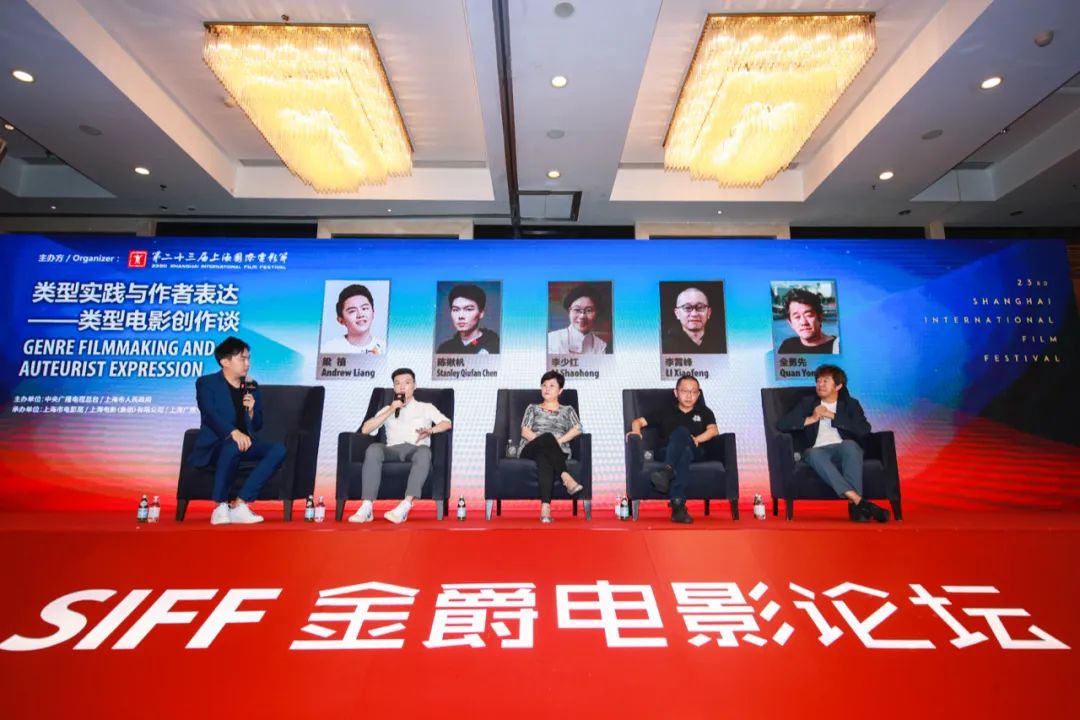2020-07-30
SIFFORUM | Boundary to be blurred but not characters
In recent years, with the continuous expansion of the scale of China\'s film industry, the audience market has an increasingly obvious demand for the subdivision of contents, and film types have become more and more diversified. What opportunities have genre films brought to Chinese filmmakers? How to establish a distinctive personal style in the creation of traceable genre films?
At the 23rd SIFFORUM this morning, themed at "Genre Practice and Author Expression - On the Creation of Genre Films", Li Shaohong, President of China Film Director\'s Guild & one of China\'s fifth generation of female directors, Li Xiaofeng, a director, scriptwriter and writer, Quan Yongxian, a famous writer and scriptwriter, and Chen Qiufan, a science fiction writer, answered questions for new filmmakers and film lovers from their own practical experience.
Boundaries of genre film are blurring
As one of the representatives of the fifth generation of Chinese directors and admitted to the Directing Department of Beijing Film Academy in 1978, Li Shaohong recalled that they mainly studied the art films, auteur systems and films with personal expression at the master class. In mid to late 1980s, there was a division between "commercial film" and "art film" in the Chinese film market, and the professionally trained directors sure preferred "art films", to the extent that when Beijing Film Studio assigned the young directors to make commercial films in 1987 and gave her a thriller genre The Case of the Silver Snake, Li Shaohong cried, "So terrible, I don\'t know what a commercial film is".
When it comes to genre films, Li Shaohong had long abandoned her incompatible trade-off between the commercial nature and artistic quality. Nowadays, it is more common to combine genre films with the auteur system to present a certain humanity and artistry. “In a sense, I think it is not so pure as a genre film, just to make use of the elements of a genre film. There are so many such genres in the international filmdom, many of which express some views on human nature in genre films.”
As a young director, Li Xiaofeng was much smoother in his film career than Li Shaohong. He directed three films of different genres, namely Ne Zha (a youth film), Eye in The Sky (a crime romance) and Back to The Wharf (a suspense film). He said frankly that he\'s not targeted at the genre films, but learned after doing, "The most important thing is whether the emotions in the genre can move me, and then I\'ll see if I can do it."
As a writer and scriptwriter, Quan Yongxian has produced excellent spy dramas such as Snow Wolf and The Brink, and his latest spy movie, Impasse, is directed by Zhang Yimou. Quan said that as the films develop, traditional genre films are actually expected to make some breakthroughs and incorporate more personal artistic pursuits, “For example, Design of Death is not a typical genre film, but there are both elements of a genre film and something very personal from the director. I think this is also the trend of development, i.e., the genre film boundaries may be more and more blurred.”
The rise of The Wandering Earth has made the science fiction film a new favorite in the Chinese film market. Yet Chen Qiufan, a science fiction writer, analyzed that science fiction itself is not a genre able to be developed alone, but to be grafted with other genres into a complete works, “The so-called genre is the contract between the author and the viewers, who go to see the movie with some strong expectation. You watch a horror movie, in the hope that it\'ll scare you. Now the boundaries of genres are constantly changing and blurring.”
Characters are the best grasp of genre films
From Snow Wolf and The Brink to Impasse, Quan Yongxian has become a representative symbol of spy dramas. Speaking of the creation experience, he pays more attention to the character relations than the plots, and is used to expressing the character relations in the atmosphere of spy, since human nature will be naturally magnified in the spy dramas and violent events. “For instance, The Brink, I put the role play of a person in a particular situation and his/her life experience in the context of spy. In fact, I wasn\'t that clear about what kind of spy story I was going to tell by the genre of spy drama, and I basically started with the characters. I think the most important thing is to write about characters and stories, for we can be touched by characters only."
The creative ideas of starting from characters and putting characters first were unanimously recognized by the other three filmmakers. Li Shaohong recalled that when filming The Case of the Silver Snake, she had expected Jia Hongsheng to play a characteristic policeman, but Jia kept pestering the director for a different role and ended up being the eccentric cinema projectionist we saw in the film. It is precisely because of this character that all the stories and plots in the film have been established, “When we do not have a very thorough understanding of genre films, I think writing characters is the best grasp. Characters are the first element of creation, either the literary or genre films. Only with the character can we know how to write his/her behavior or personality to complete the whole film. We find him/her through the concept of character, and then embed him/her into the genre elements of some events.”
Every time he saw a genre, the first thing that touched him was the character and the emotion embodied by such character; then came the consideration for any genre. He believed that even the same genre might be totally different in terms of its contents and ways of expression in different countries and cultures.
Compared with other genres, science fiction films are more complicated, scientific self-consistency is a must, in addition to the vivid character images, according to Chen Qiufan. "In my opinion, the science fiction filmmakers must have a very strong logical thinking ability," said Chen, "Many scriptwriters and directors may have no difficulty with the design of characters, plots and emotions, but just cannot make it logically and coherently. So when a great many films are released, we regard them to be monster-beating films or disaster ones in the guise of science fiction."
Creators need the support of rich experience more
What kind of training or preparation should a new filmmaker have if he/she wants to make a difference in the genre film, or more broadly, in the creation of films? The four honored guests gave clear suggestions from their own perspectives.
In recent years, more and more attention has been paid to the literariness of film and television works, whatever the genres. Quan said bluntly that many new filmmakers were working as scriptwriters or directors directly from the colleges or master classes, with simple life experience, that\'s a major problem; then too little reading, and not enough knowledge, "In my opinion, the creators ought to be eclectics, with very precise and careful observation of people, including the reading and knowledge, the richer the better, since a lot of things are interlinked. If you\'re just floating around on the surface of life, writing stories or creating characters will not be persuasive. Moreover, a good creator must be full of deep sympathy and compassion for people, and even benevolence, so that you can communicate with the characters more easily. I think that\'s very important."
Chen Qiufan hoped that the creators could get out of their little personal world and keep a more open mind to understand more rich and complex human nature, “Proceeding from a creator, I hope there will be a better environment for creators to explore more different characters and things. Let\'s not start from a very simple and crude standpoint and then make a lot of assumptions and judgments, but present a very colorful world. I guess, later you will feel that the core of creation is the character and the heart; if you cannot touch the heart and the character well, you may write something very superficial, thin and barren.”
Li Shaohong mentioned that more fundamentals were taught in cinema colleges, with general emphasis on literary films, and the proportion of typified forms in film education was not very high, "China Film Directors\' Guild holds the opinion that diversification is still necessary, and now, it\'s very important for directors to develop their own positioning of creation and think clearly about the positioning of their films in the process of creation. Otherwise, it would be a mess, first the genre and then the viewers, who do not know what kind of mentality or standards they shall take for the film."
Li Xiaofeng has only made three films and is still exploring. Yet from his personal experience, he said that whatever the film you\'re making, you should, at the very least, know what\'s the best in the world, "Even if you\'re making a cup today, you shall go to the best supermarket and see what the cups look like, so that you can judge whether your works will be sold out. It is just plain common sense."












